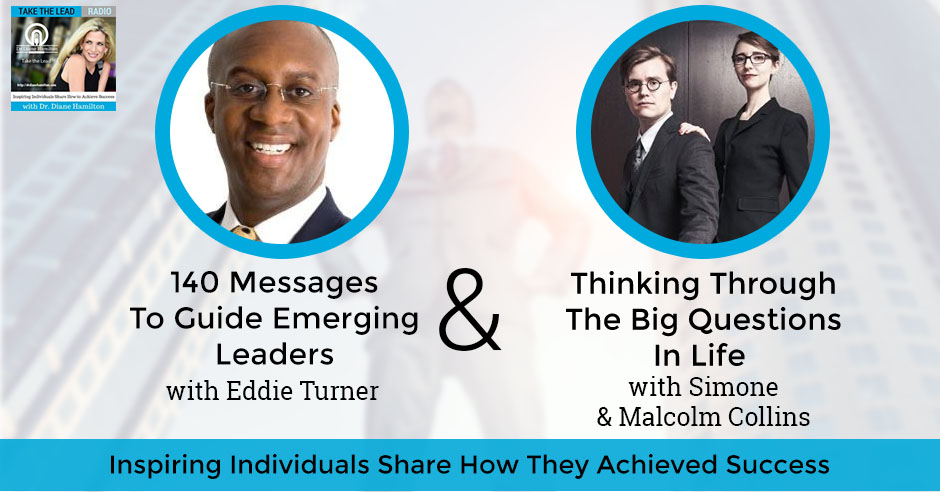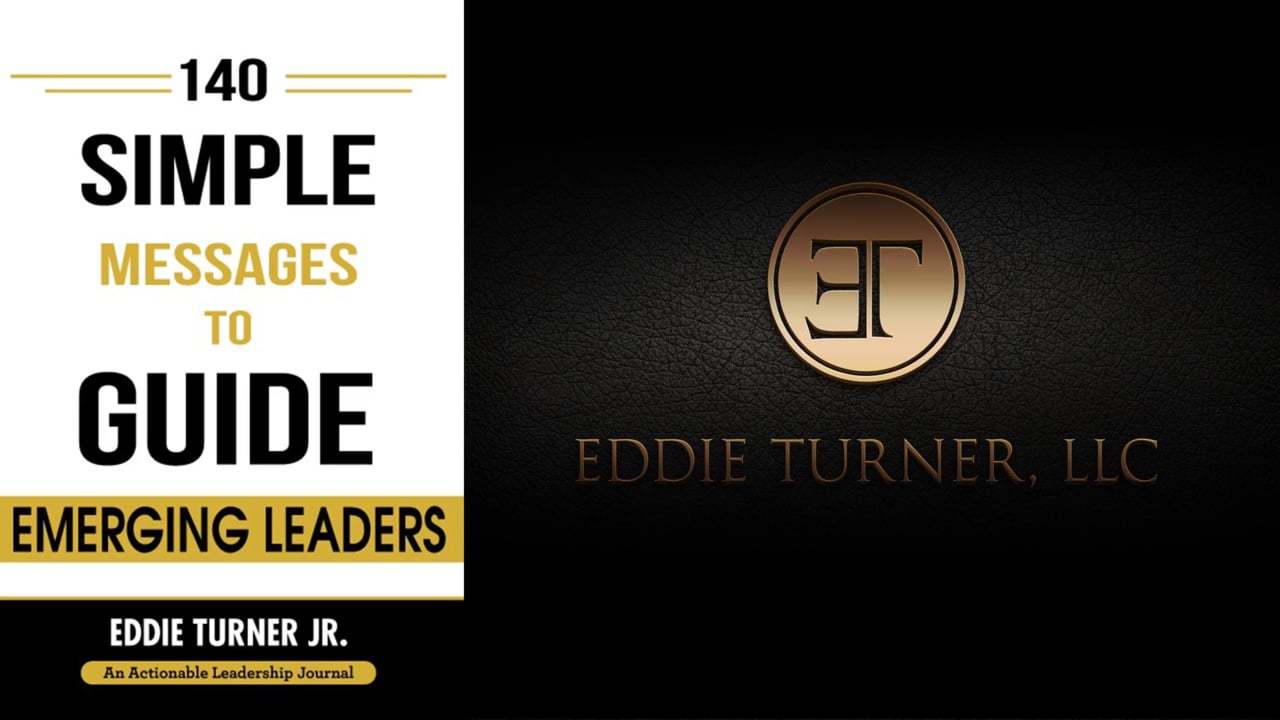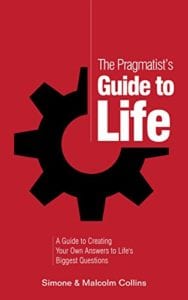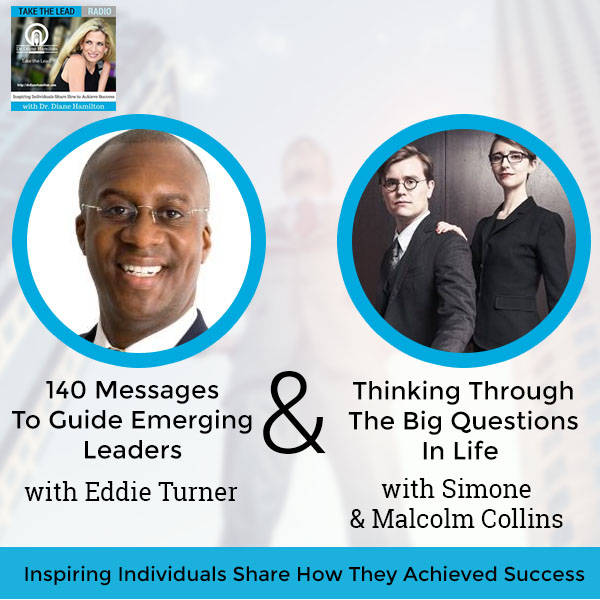In the market these days, there is an appetite for short, succinct, yet impactful messages. Eddie Turner seized that moment to produce a book targeted toward emerging leaders. Eddie is a specialist and a deep generalist. He is a certified information technology expert with digital marketing, social media and leadership development expertise. His new book is titled 140 Simple Messages to Guide Emerging Leaders. Eddie says the book is designed to be social media friendly, hence the 140, which is what Twitter was originally based on. Eddie addresses what an emergent leader is and also touches on his role in the Forbes Coaches Council.
If you have the tool set, who do you want to be? That is one of the questions that Simone and Malcolm Collins try to address in their book, The Pragmatist’s Guide to Life: A Guide to Creating Your Own Answers to Life’s Biggest Questions. Simone and Malcolm Collins are husband-and-wife entrepreneurs and the managing partners of Collins Family Ventures, a firm dedicated to purchasing companies with a focus on compassionate management. According to Simone and Malcolm, the book provides a framework to helppeople think through the big questions in life without leading them to a specific answer while equipping you with the neuro-scientific tools necessary to transform your life into how you want it to be.

We have a great show because we have Eddie Turner, Simone and Malcolm Collins. Eddie Turner is an executive and leadership coach, a facilitator, a keynote speaker, author, and a national media commentator. Simone and Malcolm Collins are a husband and wife partners. They’ve got Collins Family Ventures. They are co-authors of The Pragmatist’s Guide to Life.
Listen to the podcast here
140 Messages To Guide Emerging Leaders with Eddie Turner
I am here with Eddie Turner, who’s a specialist and deep generalist. He’s a certified informationtechnology expert with digital marketing, social media, and leadership development expertise. He’s a C-Suite Network Advisor and a change agent who has worked for several of the world’s most admired companies. He’s an international certified coach, Forbes Coaches Council and the list goes on. Eddie, it’s so nice to have you here.
Thank you for having me. What a pleasure to be with you Dr. Diane.
It’s so nice though of you to say that. I know we’ve met.
We had a chance to meet at the C-Suite Advisor Conference. I was absolutely delighted to meet you and then able to start following you. I heard that you had a leadership radio shown and my ears perked up because if it’s something associated with leadership, I’m in.
I’m in on all this too. When I referred to Doug Sandler, we’re all in the C-Suite Network Advisors Group. It’s an interesting group because I get to meet people like you and of course Jeff Hayzlett and everybody else in the group. It’s always interesting to me to meet people who take different slants on what it takes to be successful. All the different councils and things you’ve served on and now that you’ve written a new book. It’s entitled 140 Simple Messages to Guide Emerging Leaders. I thought that was interesting that you came up with 140 and I know your reason, but you want to share why there are 140?

Messages To Guide Emerging Leaders: 140 Simple Messages to Guide Emerging Leaders
Several people have asked me about that because they went 140. Most things are, “Here are ten, here are five, top three.” Essentially this is a book that is designed to be social media-friendly, hence the 140, which is what Twitter is based on. It’s targeted toward emerging leaders. I also addressed what is an emergent leader in the book. The ideal is people want something short, succinct, yet impactful. Twitter had a 140-character limitation. They’ve since expanded that to 280 characters, but the original idea was 140-character messages. Then I had an a-ha moment and that was this. On the Forbes Coaches Council, I submitted probably over 30 answers to their Q&A columns. The number of people that had read it was 2,000 people.
The most popular one, over 30,000 people have read that post. Ten of us submitted and our cap was 400 characters. That tells me and it was indicative that there is a market, there is an appetite for short, succinct messages. When I realized, “I’ve been writing these articles. I’ve done over 30, 400 characters. The new Twitter character limitation of 280 is not far off from that.” That further made me realize, “This is the time including the fact of the Zeitgeist we’re living in, where Twitter’s being used by everyone some very effectively, others maybe not so effectively. This will be a good time to seize the moment and produce a book like this for emerging leaders.”
Those extra 140 they’ve added just allows us to have a little punctuation which is nice but I still the same message is there. I’m curious though, what was your post that received more than 30,000 views?
That went off the top of my head. I have to go look for that and find it for you.
It’s interesting because if somebody asked me, I might not know either. I have certain ones that resonate with people and you probably had so many that resonated with people. That’s why you were able to come up with 140 different items. It is challenging to keep up with all these stuff that we do. With all the context that you create, what you do with the Forbes Coaches Council because I used to be the MBA Program Chair at the Forbes School of Business. I’ve done a lot of work with Forbes and I’m curious about the Coaches Council. What does that entail and how did you get to be part of that?
The Forbes Coaches Council is an invitation only organization. What it does is it allows coaches to become a part of this membership organization. As part of their membership, there are a lot of different benefits that they provide. One of those is the opportunity to become a published author of your own posts on the Forbes.com website or to contribute to the Q&As that I refer to that I’ve done where you and ten others, sometimes fifteen other people are in the same article. It allows you to take advantage of that Forbes brand to get marketing, to get credibility. That is one of the benefits of being able to be published on that particular site.
[bctt tweet=”There is an appetite for short, succinct messages.” via=”no”]What I found out is it allowed me to talk about things that perhaps may not be in my direct line of expertise. For example, I would not go out and brand myself as a branding expert to give branding keynote speeches. I have friends that I will refer people to. However, when the question comes up about branding and about marketing yourself, I have a lot to say on that and that allowed me to do that. In those 30 different posts, I talk about things that allowed me to show my full range of expertise in multiple areas as opposed to the two or three I go to market with.
I know people who do a lot of posting in different areas. You’re in so many different groups that you get a lot of exposure.It’s hard not to see you in some group and that’s great because a lot of the consultants like that and they want to get known. These are pretty prestigious group that you’re a part of. What advice would you give to another consultant who’s trying to get recognized the way you did? What does it take? Was it creating your own content on your own blog or was it just submitting content to editors and contacting them? How did you get noticed that way?
There are multiple approaches. I spoke at the University of Houston to a group of students completing their masters in human resource development. One of the tips I provided was to join an association. I took a poll of how many people in the room was a part of an association, only two hands went up. One of the individuals was a part of three. She’s taken similar approaches that I’ve taken and that is what the organization represents what you do as a professional.
The life-changing advice that I’ve received was to affiliate yourself with that association. A doctor would not imagine not joining the American Medical Association, a lawyer would not dream of not joining the Bar Association unless they don’t plan on practicing. I have some friends that just have a law degree. You want to be a part of that because that’s where you’re going to grow your network, but you’re also going to grow your expertise because you’re going to associate with likeminded individuals.

Messages To Guide Emerging Leaders: To grow your expertise, you associate with like-minded individuals.
As a part of that, different opportunities for publishing, business, those things will come organically. That’s been my approach even when I, historically for twenty years, an IT person. When I decided to leave IT, I had to establish credibility and relationships in a whole new area. I became a member of the Association for Talent Development, ATD and through that, the person who was mentoring me said, “You’re good at coaching. You should become a coach.”
I laughed at that idea, but now I’m a coach. That led me to joining the International Coach Federation and the International Coaching Community. Through that, those individuals introduced me to the National Speakers Association, NSA. That is how I met Jeffrey Hayzlett who then said, “You should become a C-Suite Network Advisor.” That’s of course where I met Dr. Diane Hamilton.
We met in Dallas. I’m going to Houston to go to Rice University and check out their business program. I have not been to Houston and that’s where you’re based.
I am in Houston. I am a coach at Rice and you’re going to be right here.
It’s going to be very exciting because I’ve never been to Houston. Tom Kolditz was on my show. I don’t know if you know Tom.
Yes, Tom Kolditz is one of the people who I report to.
He invited me to come take a look and I’m excited to see what you guys are doing there. Maybe I will run into and you’ll have to look for me on that.
General Tom Kolditz runs The Doerr Institute for New Leaders. They have become renowned. In fact, I helped secure an award and we traveled to Denver, Colorado. We received the prestigious MECO designation, Measuring Excellence in Coaching and Organizational Culture for the work at Rice University’s Doerr Institute for New Leaders, is doing around measuring the effectiveness of their coaching. It is the only university that offers coaching to every single student. Most only do MBAs or executive MBAs. Every student including freshmen is receiving coaching from professional leadership coaches dedicated to them one-on-one.
That is impressive to do for a business school. When I was an MBA Program Chair at Forbes, I saw the things that we could add into the program and I just had started on that work before I left. It wouldn’t have occurred to me at that point, what a great tool that would be. I haven’t seen that at other universities where they do that. Are they the only ones doing that you know about? I don’t know anybody else.
The only university that is doing this now is Rice University. It’s pretty incredible. Others are starting to see it. Especially as they’re getting this recognition, other people started to investigate this model and looking at how they can implement it as well.
That’s such a great thing because what people like you do is go out and you help people once they are already in business. You guys are getting to them at such a foundational time that it’s just so avoiding and reinventing the wheel.
When I walk in as an executive coach, I’m working with an executive who has in many cases developed habits that we need to change.What I have now is a unique opportunity to be one of the 30 coaches’ tasks with bending the arc early for these young people because if we can bend the arc early, we change their trajectory at eighteen, nineteen, twenty. That has a major impact on their leadership capability or capacity for the rest of their lives. It affects all the people who they will now be leading.
[bctt tweet=”Just stay curious a little longer because if you keep asking questions, sometimes the client comes to a different realization all on their own.” via=”no”]That’s so cool that you’re doing this because I’m going to be looking at this. What did you find the most interesting about this as a coach working with these young people?
I have told people that I have hope for the future as a result of working with these young people. It has increased my level of optimism. For example, I have coached international students who have come in and their very first experience in America is this program. When I started, we just had hurricane Harvey here in Houston. They’re first experience in America was Hurricane Harvey, but then a couple of weeks later here I show up as their coach. You have a coach who’s helping them and in many cases, they’ve never been to this country. They’re thousands of miles at different time zones away from their families.
It’s been more impactful for individuals like this because they have something a little bit more customized, a little bit more tailored and more specific to them as an individual than, “Here’s the guidance office or here’s the TA.” It’s been a unique opportunity to help them with this adjustment but specifically the focus is of course on leadership. Then applying this leadership to what they’re doing on campus, applying this leadership to their internship opportunity that comes in the summertime. Thinking about how they can set their five-year, ten-year goals and not waiting until they’ve graduated to start thinking about that.
I can see 140 Simple Messages to Guide Emerging Students at this point as your next book is writing itself. That’s so great that you’re doing this because there are so many things that this next generation is going to want to do a little differently. I’ve seen some of your talks and some of the stuff you talked about.Yearly appraisals, if that’s enough, 360 assessments, some of the pros and cons.
I was watching you, stalking you a little bit trying to see what it is that you talk about with people. Those are the things that need to be addressed early on. What are they teaching to that age group in terms of yearly appraisals? You hear so much about that Millennials and younger want more instant feedback, that the year is way too long. What’s the latest on that?
I can’t speak to what they’re teaching in the academic space because when I’m at the university I’m only working with the leadership institute, but I can tell you what I’m seeing with top clients. I can tell you what I’m seeing at places like Accenture, places like Deloitte and other blue-chip firms and that is they have moved away from the yearly assessment. They’re replacing that with more targeted, consistent, regular feedback. That mechanism is being used to address millennial needs. If we were to look at some of the data that’s come out, the yearly appraisal probably was never in anybody’s best interest.
Millennials have challenged us to rethink and change the way that we do that. Regular targeted feedback which has quite frankly forced more managers to become coaches and not to just be a manager. To have regular conversations, I see a tremendous spike in the number of managers enrolling in coaching programs. I teach a coaching certificate program for the Association for Talent Development and it is one of the top sellers. It is a byproduct of more and more managers coming into the program saying, “We’ve done away with the review, but I don’t know what to do next.” They take this program and in this workshop, we guide them through how to become successful managers who are coaches first, managers second.

Messages To Guide Emerging Leaders: We guide them through how to become successful managers who are coaches first and managers second.
It’s fascinating to me because I’m writing a book about curiosity and to me all these things that you teach and all the things that you talk about with all these groups is it all ties in. For a while we had buzzwords. I wrote my dissertation on emotional intelligence. We heard a lot about that. We heard a lot about engagement, culture, soft skills, generational conflict, all these things. Innovation is going to be a hot topic and that part of innovation of course will continue to grow.
If you can boost our ability to be curious and find the things that hold us back from being curious then we can help prove innovation and engagement, productivity, all those things. I’m curious if you’ve always been a curious person and do you find that curiosity is something that people are struggling with, that we need to improve more? I’m curious about your idea of curiosity.
As a coach, curiosity is absolutely critical to what I do because if I’m not curious, I’m making assumptions or I’m operating from my own experience and that is not good for my client. The people who I admire in the coaching space, Michael Stanier wrote a book called The Coaching Habit. When you take his workshops and listen to some of his speeches, is he encourages coaches to stay curious, but not only stay curious, but he says, “Stay curious just a little longer.”
Sometimes when we’ve asked the question as a coach, we ask a question, they give an answer as the client and we jumped right in and start operating from that point of view. He says, “Stay curious a little longer.” If you stay curious a little longer, you’ll ask another question and another question and to put ourselves as a coach in the mindset of a five-year-old.
If you keep asking those questions, sometimes what happens is the client comes to a different realization all on their own. Also, more importantly as a coach that this allows us to assist the client in a more powerful way because we didn’t make assumptions, we didn’t operate from our own point of view, our own life experience. We kept it on the client’s side and helped them from their operating point of reference.
It’s interesting you used the word assumptions because in my research, I found that there were four areas that held people back and assumptions was one of them. That’s one of the main factors that I’ve been studying. What I’ve included in assumptions is we think we know the answer. We don’t care about the answer and that type of thing. We already assume something that’s not necessarily the case and you give up basically.
[bctt tweet=”When something offends you, it is because it legitimately challenges you in some way.” via=”no”]It’s great that you brought that up because a lot of people go and jump right to fear or your environment. The teacher is not answering your question, your parents’ shutting you down, whatever it is.Assumption is an important part of the whole equation. That’s great that you and Michael are addressing those issues. There’s so many of you out there in these different groups that have much to offer leaders.
Many leaders don’t realize how important it is to have mentoring, coaching and outside influences because you only see things from one’s perspective sometimes. To have somebody like you come in and give them a little bit of a different perspective. You’ve got such a charming personality, it doesn’t hurt to have somebody who is fun coming in. I could see why you’ve done so well in all the things that you’ve done. In addition to that, you’re also the Ambassador Coach for NSA, aren’t you?
Yes, I have become an Ambassador Coach. They asked me to become one of the coaches for the other ambassadors whom we’ve recruited. That program has been a pilot in a Beta mode, but it will be announced formally at our annual conference entitled Influence 2018.
You have such a great background. You went to Northwestern and then Harvard? What’s your background?
I spent twenty years as an information technology professional. To do that, I had a lot of information technology certifications from Microsoft, HP, IBM, etc. That’s all I needed. Then, I got to a point where it was no longer sufficient. I was working at General Electric for their finance division and they said, “We’d like to do more with you, but you don’t have a degree.” I went to Northwestern as an adult. I completed my degree at Northwestern University in Leadership and Organizational Behavior and then I went a few years away from that.
As I’ve got more submitted in the area of leadership, I wanted to submit my credentials a little bit more. I went to Harvard to study under Ronald Heifetz, the father of adaptive leadership. It was truly one of the most transformational events in my life. In fact, he’s doing a retreat. He’s never done it before, so I’ll be back at the Kennedy School to study further for a deeper dive in the framework that he has revolutionized and used all over the globe.
How long does that program take?
Harvard students get a full semester and it’s a wait-list. Even Harvard’s graduates don’t get this course, but what he does is once a year, the Kennedy school offers this as a part of the executive education program and that’s what I was privileged to be able to take. This retreat is going to be a one-week deep dive. We’re going to be secluded there on campus with him and a couple of other practitioners who are working as a part of this consulting practice and doing a deeper dive into this framework. I’m just looking forward to it.
You don’t get home much? You travel a lot from all the things you do, I imagine.
I do a fair amount of virtual work as well. In fact, in my technology world, one of the things that I revolutionized for corporations was a way of using virtual technology in a very unique way, even at a C-level to hold effective and engaging meetings. Not the run in the middle of the meetings that people jump on with webinars. I do half and half. I do a lot of virtual work and I do a lot of face to face as well.

Messages To Guide Emerging Leaders: We’re using virtual technology in a very unique way to hold effective and engaging meetings.
I’ve taught more than a thousand online business courses and so I’m very interested in virtual training. How well do leaders buy into that?That they can get their training virtually?
For many, it’s a true paradigm shift. The idea of holding important meetings or learning online was analogous to going to a community college, if you will. I love community colleges, but some people have unfair stigmatism of it. What we found is in corporations, when we were encouraging people to do these things, they looked at it as, these online courses for colleges, that these degrees or these programs were not as good as the face-to-face programs. All universities even the elite ones have an online program or some type of a hybrid.
As that has changed in academia, so has the stigma changed inside of corporations. What I had to do in my work is prove the ROI in terms of not only the investment and the financial component, but the ROE, the Return on Engagement. Could I deliver a highly compelling program that saves money but still held the engagement high and achieve business results?
I’m so fascinated with everything you’re doing. Everybody else here is probably going to want to know a lot more about how to find you and how to get your book. In general, can you share some websites or information of how they can reach you?
I’m Eddie Turner and I’m on all the major social media sites. You can just type Eddie Turner, I will come up. My website which is being revamped is EddieTurnerLLC.com.
Thank you, Eddie. It was so much fun having you on the show.
What an honor and a treat to be on your show. Thank you for having me.
You’re welcome.
Thinking Through The Big Questions In Life with Simone and Malcolm Collins

The Pragmatist’s Guide to Life: A Guide to Creating Your Own Answers to Life’s Biggest Questions
I am here with Simone and Malcolm Collins, who are a husband and wife, entrepreneur team and managing partners of Collins Family Ventures. A firm dedicated to purchasing companies with a focus on compassionate management. Malcolm was originally a neuroscientist who focused on brain computer interface and the evolution of human cognition. His work is on display at the Smithsonian. He met Simone while attending Stanford Graduate School of Business. She was the Director of Marketing at HubPages. Together, they’ve co-authored the book, The Pragmatist’s Guide to Life: A Guide to Creating Your Own Answers to Life’s Biggest Questions.I’m so glad to have you here Simone and Malcolm.
We are thrilled to be here with you.
I love your pictures by the way on your websites. You have some especially on LinkedIn and on Malcolm’s site. I liked that one a lot.
That was done as an expose on us for a D magazine our firm being one of the upper and coming investment firms in Dallas.
You guys seem like you have a cute sense of humor, too. You have this look like, “Were fun.” I imagine you guys are a lot of fun.
I don’t notice that we have a sense of humor, but people would enjoy laughing at us. Our regular life is humorous to other people.
I love the sense that you guys have a playful nature. It’s interesting what you studied because I studied emotional intelligence for my dissertation. I’m interested in any of the brain thinking impact thing, human cognition got to be very fascinating. What got you into that Malcolm?
That’s where I started my career. I was fascinated in trying to figure out how humans tick and what made them make the decisions they make, why they do what they do. One area that fascinated me from the very beginning which played a major part in some of our later thinking on these subjects was cults. Why people, otherwise, intelligent stable people immediately shift not only their views of the world, but in a way, their personality.
How one stimuli to them before could cause happiness, now causes anger or something like that. How this prism of our subconsciousness will filter certain stimuli and then create certain emotional reactions, and then we choose how we respond to those emotional reaction. I felt like I had gotten to a point where I figured out a lot of it.
A lot of the mainstream psychological schools, they weren’t wrong they were just looking at things too granularly. Everything they looked at needed to be experimentally probable, where I was looking at larger models of cognition. I thought, “Maybe I can learn more about this by applying it to people working in systems. Maybe I can exploit those systems to make money.” I went to Stanford Business School. I transitioned my career into a business path where I tried to employ a lot of these theories I had, and they just worked swimmingly.
That’s one of the reasons why unlike a lot of authors who are writing these advice books, we don’t take any money from our book. It all goes to charity. We sell it for as cheaply as we can, only $0.99 because we’ve been able to employ what we learned to sustainably make a large amount of money. We just want to help other people live these lives we’ve been able to live because of that.
I’m interested in the charities. Simone, does he psychoanalyze you? What’s it like to be with somebody who studies how people react and their behaviors?
He didn’t psychoanalyze me, he transformed me. When we met, I was a completely different person who had never thought through their values or what they wanted from life. Six years later, I started out as a social media manager, a glorified term for customer service rep. Now, I’m the CEO of a company. He’s onto something.
[bctt tweet=”You’re always selling something and the way you present yourself is your sales tool.” via=”no”]With me, I studied personality for my book about personality assessments and it’s hard not to just look at people then start to think about all the training you had. That’s why it’s good that what you’re saying that he transformed you and that’s what you’re trying to do with your book?
The book is in two sections. I’ll start with the second section first. If you can brainwash yourself to be anyone you want, it trains you how to brainwash yourself to be any person you want, to react to stimuli in any way you want. Then, the first section, the majority of the book is based off of, if you have that tool set, who do you want to be? It explores of who do you want to be without training to guide you to any paths. So much of the material out there is like, “Obviously, you want to be happy. You want distribute, aggregate happiness amongst the population.”That’s just a societal judgment and that’s not necessarily what most people want to maximize with their lives when they think about it.
What do they want to maximize?
The funny thing about the people who read our book is they at first came back to it and they’d go, “It’s obvious you’re trying to guide people down a certain path. They’re trying to guide them to certain answers.” We were always like, “Every single one of you has said, “We’re obviously trying to guide people to a different answer.” We love that because that showed we weren’t biasing them down at specific paths.
Simone, what would be the thing that would make someone think that you’re trying to guide them? Can you give an example?
In our book we start off with the basics. What do you value most in life and what do you want to maximize with your life? We call this your objective function, the thing you want to maximize. Then, we go through all of the things that we’ve found to be common, conclusions people come to, helping others, helping yourself, making people happy, making sure that human race survives in the long-term, saving freedom, reducing suffering. Each of those things goes through why you might want to maximize that thing in your life and also why you might not.
We pull people through different thought experiments that make them very fairly uncomfortable, like, “If this is what you value, are you willing to sacrifice everything else?” One person who didn’t like reading our book said, “You gave everyone reasons why they might want to live and things they want to maximize in life, but then you talked about why they’re all wrong.” We’re like, “No, we’re just trying to give you a litmus test to help you figure out what you logically think is the best.”
It gives you legitimate challenge with everything. The only one-star review that we had on Amazon says, “The book will make people dangerously suicidal.”
That’s what you want them to write about your book. What do you think is in the book that would make them think that?

Messages To Guide Emerging Leaders: Logically think through what you value and what you truly believe and want to maximize with your life.
Our way of not guiding you towards a specific reason to live is by listing every reason to live and explaining why it’s probably wrong. She took that as walking away from the book, “They just convinced nothing matters.”
It’s so funny how we all have these different perspectives and you talked about these thought experiments. Is there something else that you can explain as a thought experiment?
The happiness is a good generic one.
A lot of people say, “I want to maximize my happiness in life or the aggregate happiness of all humans.” The thought experiment that we present with that is, “Okay, great.” We’ve just invented these pods that we can put people in and it will make them live 100% longer so they’ll live up to 200 years. They will feel nothing but perfect happiness.
For whatever emotion they’re trying to maximize. They may say fulfillment, they may say, “It’s more complicated than happiness.” This machine can maximize whatever complicated emotion you want, and exactly the proportion. You’re like, “I need a bit of sadness,” it will give you a little bit of sadness.
It is the perfect maximizer of whatever emotional state you think is most important, but to put people in there and give them that and make their lifespans longer, to maximize this thing that you believe has inherent value. They have to go into this pod and never come out and that’s going to be the rest of their life.
You choose that. “Is that what you’re trying to maximize?” When you want to do that for everyone as well, you have a button that can put everyone in the world in that at the same time. Do you push that button?
Why do we have to be in separate pods to maximize our life? I guess I don’t understand that.
What we’re trying to extract here is a single question. Do you think that life with a perfectly maximized X emotion is a valuable life? If somebody is saying, “I think that my purpose in life is to maximize happiness among others.”
What you’re saying is like, “Why are they all separate?” That’s indicating, maybe you think there’s some inherent value to people being together or collaborating. That helps you parse out what you care about. What I want is perfection or what I want is happiness.
Her specific takeaway was, “This isn’t good because it still lacks this thing.” Therefore, this thing that you think that the system lacks is something of inherent value to you that extends beyond aggregate happiness or something like that. When you’re structuring your life to maximize the things you think have value, you’re not just trying to maximize happiness, you’re trying to maximize collaboration as well.
There’s nothing that exists in a vacuum. If you put anything to the maximized level, it’s going to be inherently bad. It’s just like a little bit of ice cream is okay. You eat everything of ice cream in the world and it’s not good. For me, I’m curious about curiosity. I’m writing a book about curiosity. Let’s use curiosity in that place of happiness. If I want everyone to be more curious, how do I look at that?
Curiosity is a subject that we had a lot of interest in and we talked about it in our book. It is something that we’re very fascinated by.
We say that’s a downstream thing. We start with helping people figure out.
She’s exploring it as an intrinsic value. We would say, “What are the things that are most valuable to be curious about? Where are the issues? Many people want to be curious and when we look at that way, cognition, when we talk about how our emotions work and why we experience different emotions and stuff like that, one emotion that we find to be one of the most valuable human emotions that exist is offense. This is an emotion that you only experience in a very specific circumstance. It is your brain flagging a certain stimuli or worldview as challenging to your own worldview.
[bctt tweet=”We have 30 seconds to make a judgment about someone.” via=”no”]If you view an action or other groups’ ideas as just being ridiculous, you typically aren’t offended by it. You can look at the church protests the funerals of dead soldiers and you’re like, “That’s ridiculous. That is comically stupid.” When something offends you, it is because it legitimately challenges you in some way. This can be categorized into two categories. One, you don’t need to focus on as much which is your self-image. Maybe they’ll say you’re stupid and you don’t want to be stupid.
You see yourself as smart, but there’s a part of you that thinks you’re stupid or might be stupid, then you find it offensive. The other thing is when it challenges your view of what’s true in the world or what you believe is real. That’s where this becomes very interesting. That’s like your brain flagging. This is a real challenge to your worldview, but what your brain is trying to do is get you to ignore it. What it means is you need to be extra curious about it because it means that you might be wrong.
If you’re wrong, you probably want to know. You don’t want to live your life under a false pretense.
With my research is on curiosity, I’m looking at the things that hold you back so you’re finding out what it is that’s maybe you’re wrong. You’re looking at those opposing things. To me, it was important to study that because you could read all you want about curiosity and curiosity is great and all that, but if you don’t know what it is that’s holding you back, how do you progress? Are you trying to help people figure out the things that are holding them back?
We’re saying that your brain is literally flagging. It’s making it easy for you. When you get offended, your brain is red flagging what’s holding you back. You can take that red flag and say, “That means turn around and walk away. Don’t engage the thing that’s holding me back.” Or you can say, “That means I need to honestly engage with this subject.”
You’re answering the question in your book.You have four chapters. You have what is the purpose of my life? How can I best realize the purpose in my life? Who do I want to be? How do I want other people to think of me? The last one stood out to me because I’m curious what’s so important about how we want other people to think of us? I remember taking a personality test for a job once and there were two columns.
At the top it said, “This is how I see myself,” and it had a bunch of words and then on the other side it said, “This is how others see me,” and the same bunch of words and you had the circle and I assume that hoping that they were the same I guess. I don’t know I got the job. What do we want other people to think of us and why is that important?
We see ourselves as tools for maximizing our objective functions. In terms of affecting our internal function, we’re trying to create an autopilot version of ourselves because we’re all for most of our lives on autopilot that react in optimal ways. Instead of reacting to a challenge right then, “I can’t do this. I’m depressed. I’m going home and eat popcorn.”
You would say, “This is a challenge. Let me take this on. This is fascinating. I can do this.” Why it’s so important to have an optimal public persona is you are always selling something. Whether you’re trying to get into a club you really want to go to or tell someone to hire you or raise money from people, get people to read your book, you’re always selling something. The way you present yourself is your sales tool. That’s your pitch.
What we argue is that a lot of people believe that the world can come to understand them in all of their beautiful complexities, when that’s completely ridiculous. A metaphor that Malcolm uses in the book is, let’s say that we’re selling the word processing software. One of our engineers says, “The code speaks for itself. Put the code on the box.” You see is like a bunch of word processing software boxes from different companies all with just a bunch of code on them. We have no idea. It looks pretty much all the same. The only things that are different are maybe some interface stuff. If we put the cool differentiating factors like this one has this cool grammar check and this one does speech. It makes you eloquent.

Messages To Guide Emerging Leaders: We find it really problematic that people are able to live their entire lives optimizing for one thing.
Essentially, what people want to see when they look at you, when they interact with you is how would you relate to their story and their lives? Whenever you gave them information that doesn’t help contextualize you in that framework, unless they’re like your spouse, your best friend or something like that, you’re just being narcissistic and boring them with information that has no value to them or no interest in how they place you in their worldview. The reason why it’s important is because everyone, no matter what you’re trying to maximize, whether it’s helping other people, whether it’s a specific cause, whether it’s your unhappiness, what other people think of you matters, and it matters a lot. It’s probably like 60% of the battle in whatever you want from life.
Unless we want to become a mendicant monk who achieves enlightenment alone in the woods.
You are bringing up things that tie into empathy, emotional intelligence and some other things.We talked about the platinum rule now instead of the golden rule.You want to treat others as they’d want to be treated. We’re focusing on other people’s perceptions more than our own. Is that pretty much what you’re saying?
Not exactly. We’re talking more about how people categorize other humans in their mind.
We have 30 seconds to make a judgment about someone. We’re not going to take a lot of time to think about them. Even your closest friends, how much time have they spoken to get to know you? It’s about making sure people get the information they need to properly categorize and predict you in a way that is advantageous to you.
Some people might say you’re wearing a mask, that you’re picking different words on one side of the screen than the other. Should you pick different words than the example I gave you before? Should you see yourself as others see you and you’re saying no?
I guess it would come back to the analogy we used. In the word processing software, is it wearing a mask by not printing the computer code on the box?
We argue, no. The only way to genuinely communicate yourself effectively is to curate and carefully present the information that helps people truly understand who you are. If you give people just the full code of yourself or try to get them to understand the complex you, they’re never going to understand you.
Everybody who exists within the same culture have about the same perception of themselves. Everybody wants to see themselves as smart, hardworking, a little understood, hard on themselves, has a playful side, the generic story that everyone tells themselves. That’s why things like horoscopes are so effective because everyone basically has the same thing. They want to think about themselves and tell everyone else about themselves. When somebody says, “I’m actually complex.” Typically, what they mean is they’re not accepting the story I’m telling myself about who I am.
[bctt tweet=”Life is about balancing different things and different values.” via=”no”]You’re doing all this work to try and get people to understand their purpose in life, have realized that purpose and be realistic about thinking too much about going in one direction or another, that you got to have balance. Is there a balance associated with this that you’re trying to achieve?
We think if you believe that balance is critical to your objective function, which some people do. Some people say life is about balance. It’s about balancing different things and different values. I want to determine what the optimal amount of that balance is to optimize that balance. They may say that I want to help other people optimize that balance in their lives and that’s part of my objective function. We would say that’s not intrinsically necessary what is true about the world. It does not necessarily what has value. That’s one hypothesis about what has value, but we try to not push people towards any specific hypothesis.
Do you both value the same things or are they completely different?
About the same thing.
All the proceeds from the book The Pragmatist’s Guide to Lifegoes to charity, what charity or are there multiple charities and how did you choose which charity?
Not the full $0.99 because part of it goes to Amazon, not a ton. It goes to The Pragmatist Foundation which is meant to promote intentionality and provide a place that people can go to that will help them think through what add value to them without guiding them towards any specific path. Anyone you go to, you go to a church and they’re going to tell you, “This is what has value to you.” You go to a professor and they’ve got their philosophical answer. Most people who you would go to as experts of this, have already thought and then come to their own conclusion.
You see this in the many of the self-help books or philosophy books. They just assume, “Of course you want to be virtuous.” Then, they define virtue. Of course, you want to help others or of course you want to be happy and maybe you don’t. Maybe that’s not what you value. We find it problematic that people are able to live their entire lives optimizing for one thing. We’ve met so many successful people who’ve made it and yet they feel confused and unfulfilled.
We used to be both venture capitalists. We interacted with a lot of people who had maxed out their lives. What they realized after starting successful startup, after exiting, having all this money, having all this fame, having all this respect, they’re like, “This was not what I wanted. I assumed that what I wanted would come to me if I just kept pressing at it. I assumed that after I had achieved X, Y and Z, it would be obvious of what I wanted. I started hanging out with a bunch of other people who knew what they wanted, but I should have had at the beginning taken the time to think about what I want to do.”
I’m curious about how Simone’s parents feel. You said you’ve been transformed and your values may have changed from what you grew up with in childhood. How do they look at what you’re doing and how you’ve transformed? Was that a positive or not a positive reaction?
I wouldn’t say it was a positive reaction. I was maybe the black sheep in my family. I grew up in a family of a very classic Silicon Valley. They were like hippies when hippies were a thing. I was born in Japan. They were on this some spirit journey, taking martial arts in Japan and then doing Tai chi in China. I came into their lives and made things difficult.
I’ve always been very conservative. I wanted to always do my homework, stay home and not do anything. “Simone, go out. Experiment, explore.” They were most children dream of parents. “Do whatever you want.You can get a B, it’s okay. You don’t have to get straight A’s.” That was my life and I grew up for a very long time because that was what I was surrounded with. Believing that what I needed to optimize for in life was to be happy, to commune with nature and reach some level of spiritual transcendence.
I went on spiritual journeys every single year to some other country, in some remote shrine to understand these mysteries of existence. I wore these colorful outfits to make people smile and laugh and I hosted parties. When I met Malcolm, he prompted me to relate myself, for the first time to ever logically think through what I valued and what I truly believed and wanted to maximize with my life. What my hypotheses were for achieving those things, I dropped all my colorful clothes. I dropped all my colorful mannerisms and weird ways of life and focused entirely on business and accumulating money and power. I turned to wearing all black and they were terrified.
It was obvious to them that she was achieving what she wanted in life, but it wasn’t what they wanted for her. They wanted her to let go and be a hippie.
[bctt tweet=”We’ve met so many successful people who’ve made it and yet they feel confused and unfulfilled.” via=”no”]The reason I asked that is because in my book I’m looking at the four things that hold people back from curiosity. The fourth factor is environment which I’ve included family, friends, peers, because certain things we’re raised to not like certain things because it’s not cool around our families and our friends or whatever.
We don’t explore certain things. You helped solidify my theory of what holds us back sometimes. It’s not intentionally that our families hold us back, but maybe they don’t have an appreciation for the same things that we do. It’s interesting what you’ve done, and a lot of people are going to want to find out more about your book. Can you just share some information, your links or whatever that will help people?
You can find our book easily. Just search The Pragmatist’s Guide to Life on Amazon. Our website is Pragmatist.Guide. If you want to talk directly with us, we’d love to talk about where you’re getting stuck or what’s going on in your life, email Malcolm@Pragmatists.Guide. If you want to get involved with us in any way, we are very much available and happy to chat. Plus, we also run a travel company, TravelMax.com. We are happy to help anyone book whatever spiritual journey they need to go on to figure out who they are.
Thank you so much Simone and Malcolm. It was so interesting to talk to you.
We find your work fascinating and this is fun.
We hope people check out your book as well.
Thank you. I want to thank Eddie Turner and Simone and Malcolm Collins. What a great show. I hope you join us for the next episode of Take The Lead Radio.
About Eddie Turner

Eddie is an International Certified Coach™. He practices executive, leadership and personal development coaching as a member of the International Coach Federation, the International Coaching Community, Forbes® Coaches Council and as an Affiliate Member of the Institute for Coaching, at McLean Hospital, Harvard Medical School affiliate. His new book is titled 140 Simple Messages to Guide Emerging Leaders.
About Jason Hartman

Important Links:
- Eddie Turner
- Forbes Coaches Council
- The Coaching Habit
- Influence 2018
- The Doerr Institute for New Leaders
- EddieTurnerLLC.com
- Collins Family Ventures
- The Pragmatist’s Guide to Life: A Guide to Creating Your Own Answers to Life’s Biggest Questions
- The Pragmatist Foundation
- Pragmatist.Guide
- Malcolm@Pragmatists.Guide
- TravelMax.com



0 Comments